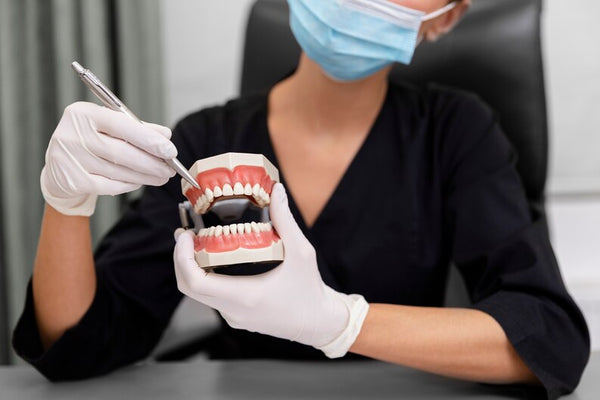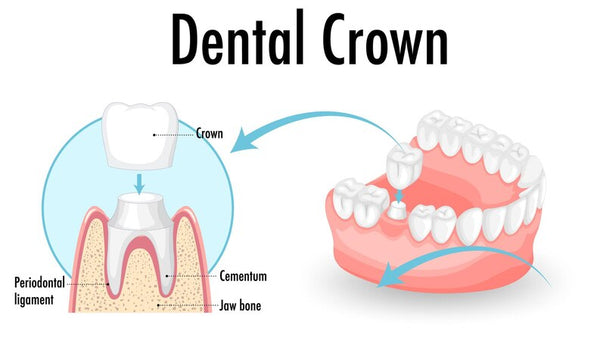
How to Take Care of Your Temporary Crown
Introduction: Understanding the importance of temporary dental crowns
Temporary dental crowns play a crucial role in dental care. They act as a protective covering for a tooth that has undergone a dental procedure, such as a root canal or the placement of a permanent crown. These temporary crowns provide stability to the tooth, prevent sensitivity, and serve as a placeholder until the permanent crown is ready to be placed. It's essential to understand that temporary crowns are less durable than permanent ones. They are made of temporary materials designed to be more fragile, allowing for easier removal when the permanent crown is ready. Therefore, it's crucial to handle and care for them with caution.
This guide aims to provide detailed information on how to take care of your temporary dental crown. It will cover precautions and general guidelines, dietary considerations, and preemptive measures for crown protection. By following the advice in this guide, you can ensure your temporary crown's longevity and proper functioning.

Precautions and General Guidelines
Avoiding potential damage to your temporary crown
To avoid any damage to your temporary dental crown, it's crucial to follow these general guidelines:
Refrain from hard or sticky foods: Avoid chewing hard candies, ice, or sticky foods like caramel that can dislodge or damage the crown.
Prevent excessive pressure while chewing: Chew on the opposite side of your mouth or use your molars to lessen the pressure on the temporary crown.
Be cautious with dental hygiene routines: Avoid forcefully pulling up on the floss, as it can loosen the crown. Instead, slide the floss out gently and practice good oral hygiene habits.
Managing discomfort and sensitivity
Temporary crowns can sometimes cause mild discomfort or sensitivity. Here's what you can do to alleviate these symptoms:

Deal with mild sensitivity: If you experience sensitivity, try switching to a toothpaste designed for sensitive teeth. These toothpaste options offer relief by desensitizing the nerve endings in your teeth.
Use over-the-counter pain relievers appropriately: If you experience discomfort, over-the-counter pain relievers can help. Follow the recommended dosage and consult your dentist if the pain persists or worsens.
Contact your dentist if severe pain occurs: While some discomfort is normal, severe pain is not. If you experience intense pain that radiates or persists, it's essential to contact your dentist immediately. They will be able to diagnose and address any underlying issues.
Practicing good oral hygiene with a temporary crown
Maintaining good oral hygiene is vital, even with a temporary crown. Follow these guidelines to ensure its longevity:
Brushing gently and effectively: Use a soft-bristled toothbrush and brush your teeth gently in circular motions. Pay extra attention to the gum line and the area surrounding the temporary crown.
Adopt proper flossing techniques: Slide the floss gently between your teeth, making sure to avoid forcefully pulling up on the floss. Instead, move the floss up and down in a C-shaped motion to clean the teeth' sides effectively.
Rinse with fluoride mouthwash: Rinse your mouth with fluoride mouthwash after brushing and flossing to enhance the health of your teeth and gums. This helps prevent gum disease and tooth decay, which can affect the longevity of a temporary crown.
Dietary Considerations for Optimal Temporary Crown Care

Foods to avoid for crown protection
To ensure the protection and stability of your temporary dental crown, avoiding certain foods that can cause damage is essential. These include hard and crunchy foods that can dislodge the crown. Avoid biting into hard foods like nuts, popcorn, and crusty bread that can loosen or break your temporary crown. Sticky and chewy foods that can cause damage. Steer clear of sticky candies, chewing gum, or other foods that can pull the crown off or damage its structure. Acidic foods and beverages that may erode the crown. Acidic foods and drinks like citrus fruits, tomatoes, and soda can erode the crown material over time. Limiting consumption or rinse your mouth with water after consuming them is best.
Recommended foods for a temporary crown
Choosing the right foods can help minimize pressure on your temporary crown and prevent discomfort. Soft and nutritious options that minimize pressure: Opt for soft foods like mashed potatoes, cooked vegetables, yogurt, and soup that won't put excessive pressure on your temporary crown. Hot or cold foods and beverages may trigger sensitivity. Stick to foods that are at a moderate temperature to minimize any discomfort. Calcium-rich foods for overall dental health: Incorporate calcium-rich foods like cheese, milk, and leafy greens into your diet. Calcium helps strengthen your teeth and supports overall dental health, including the integrity of your temporary crown.
Maintaining a balanced diet during temporary crown care
It's essential to maintain a balanced diet during the period your temporary crown is in place. Ensure adequate nutrient intake for healing. Eating various nutritious foods, including fruits, vegetables, whole grains, lean proteins, and healthy fats, supports healing and oral health. Modify eating habits without compromising health. While avoiding certain foods is necessary, don't restrict your diet to the point where you're missing out on essential nutrients. Consult with a dietician if you have concerns about your dietary restrictions. Seek advice from a dental professional for dietary concerns. Consult with your dentist if you have specific dietary concerns, such as allergies or dietary restrictions. They can provide guidance and resources to help you make appropriate food choices.
Taking Preemptive Measures for Temporary Crown Protection

Utilizing mouthguards in high-risk situations
While temporary crowns are designed to withstand normal chewing, protecting them during high-risk activities is essential. Consider the following measures:
Protect your crown during physical activities: If you play contact sports or engage in activities where your mouth may be at risk, such as biking or skateboarding, wearing a mouthguard is vital for added protection.
Wear a custom-fitted mouthguard for added security: A custom-fitted mouthguard provides better protection than generic mouthguards. Consult your dentist, who can create a mouthguard tailored to fit your mouth and protect your temporary crown.
Discuss specific concerns with your dentist: If you have particular concerns about activities that may put your temporary crown at risk, discuss them with your dentist. They can provide personalized advice and recommendations based on your circumstances.
Overcoming habits that may harm your temporary crown
Certain habits can inadvertently damage your temporary crown. Here's what you can do to overcome them:
Quit nail-biting and pen-chewing habits: Nail-biting and pen-chewing can put unnecessary pressure on your teeth and potentially damage your temporary crown. Find healthy alternatives or seek professional help if needed.
Avoid teeth grinding or clenching: Teeth grinding or clenching, known as bruxism, can damage natural teeth and dental restorations like temporary crowns. Consider wearing a mouthguard to protect your teeth and crown from the effects of bruxism.
Seek professional help for habit correction: If you're struggling to overcome habits that may harm your temporary crown, seek professional help. Your dentist may recommend behavioral therapy or other approaches to help you break these habits.
Understanding the limitations of a temporary crown
It's essential to recognize that temporary crowns have limitations and are not meant to last indefinitely. Keep the following in mind:
Recognize the temporary nature of the crown: Temporary crowns are designed to be easily removable. They serve as a temporary solution until the permanent crown is ready. Understand that temporary crowns are less durable than permanent crowns.
Avoid excessive pressure on the crown: While temporary crowns are resilient, they require care and caution. Avoid biting down on complex objects or using excessive force when chewing to prevent damage.
Follow dental advice for permanent crown placement: Temporary crowns are usually in place for a few weeks. Follow your dentist's advice regarding the timeframe for permanent crown placement to ensure the success of the overall dental procedure.
Conclusion
In summary, caring for your temporary dental crown is crucial for longevity and proper functioning. By following the precautions and general guidelines, practicing good oral hygiene, considering dietary considerations, taking preemptive measures, understanding the limitations, and adhering to dental advice, you can ensure the success of your temporary crown. With the answers to frequently asked questions and proper care, you'll have peace of mind while your temporary crown serves its purpose and paves the way for the placement of a permanent crown. If you want to find essential dental products at an affordable price, Just visit Dental Finds to get your valuable products.

